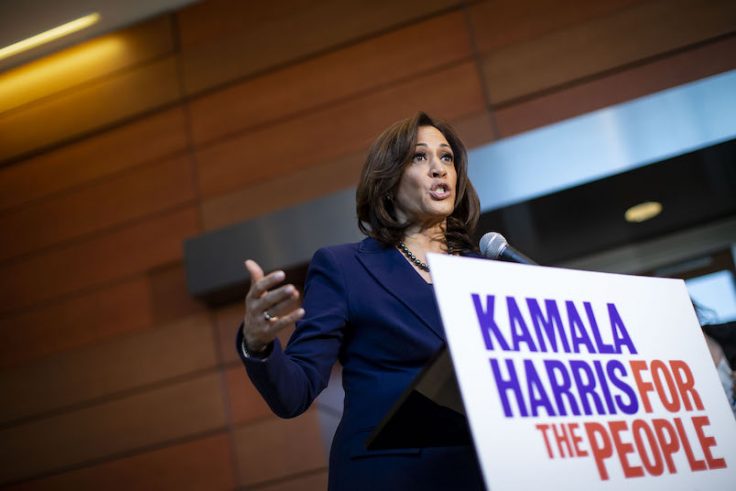Democratic presidential hopeful Sen. Kamala Harris (D., Calif.) once cribbed a union interest group's talking points in an effort to influence a pension reform ballot initiative.
In 2014, a bipartisan group of California political leaders and residents petitioned for a ballot measure that would have helped the state deal with hundreds of billions of dollars in unfunded pension liabilities. Harris used her authority as state attorney general to summarize the pages-long proposal into a paragraph that reflected word-by-word the language provided by pro-union interests. Wayne Winegarden, senior fellow at the Pacific Research Institute, said Harris's actions helped tilt the scales against the measure, which was eventually withdrawn. California taxpayers will pay the price as the state shifts ever-larger portions of its budget to pay union retirees rather than current state workers and services.
"[Harris's] deceptions caused people to vote for ineffective government services in the future coupled with higher future taxes — a combination they would not likely have voted to support if they had a more accurate understanding of the tradeoffs involved," Winegarden told the Washington Free Beacon.
The Harris campaign did not respond to request for comment.
The public pension system is now saddled with around $250 billion in public debt, according to the state. Other pension experts have found that the state figure grossly overestimates California's financial health by assuming stock market gains that are unrealistic and through other accounting tricks. The Pacific Research Institute estimates that real pension debt is close to $1 trillion, while Stanford researchers put the figure at more than $330 billion.
Harris, who was elected to the U.S. Senate in 2016, raised roughly $250,000 from labor groups in the last four years, according to the Center for Responsive Politics. She also received glowing reviews from California unions for her work as the state's lead prosecutor.
Government watchdogs have long identified California's public pension system as unsustainable. Little Hoover Commission, the state's oversight agency, wrote in a 2011 report that California must roll back its pension plans for current and new employees.
"California's pension plans are dangerously underfunded, the result of overly generous benefit promises, wishful thinking and an unwillingness to plan prudently," the report read. "Unless aggressive reforms are implemented now, the problem will get far worse, forcing counties and cities to severely reduce services and layoff employees to meet pension obligations."
The dire situation motivated four Democratic and one GOP California mayor to submit a petition that would allow local governments to reduce pension benefits for existing employees in 2013.
In response, union groups sponsored a public opinion research report, obtained by the L.A. Times, that discovered that certain keywords like "eliminating" can form a "visceral negative response from the voters."
"Over 50% are VERY unfavorable to 'eliminating Police, Firefighters, and Other Public Employees' Vested Pension Benefits' (54% VERY unfavorable)," the report said.
Harris summarized the ballot measures using similar languages.
"[The initiative] eliminates constitutional protections for vested pension and retiree healthcare benefits for current public employees, including teachers, nurses, and peace officers, for future work performed," the ballot summary prepared by Harris said.
"Kamala Harris created a ballot summary that was a mischaracterization of the 2014 initiative using negative language that had been poll-tested by public employee unions," Chuck Reed, Democratic mayor of San Jose, told the Free Beacon. "State law requires summaries to be fair and accurate. Hers was neither."
Winegarden said Harris's summary created a distorted understanding of the initiative by asserting that the legislation would undermine constitutionally protected rights. He added that Harris's framing of the initiative excluded details about the dire budgetary situation, creating the incorrect impression that "the advocates simply want to punish public sector workers for the sake of punishing them."
"In combination, this framing of the very complicated issue gives the incorrect impression that there are costs imposed on public sector workers in return for no benefits," Winegarden said.
Harris's characterization of the initiative provoked condemnation from both liberal and conservative publications at the time. Reed sued the Californian government in 2014 for publishing a misleading ballot summary, but was defeated in the Sacramento Supreme Court. The ballot supporters ultimately withdrew the initiative citing the ballot summary.
Harris's office then commented that the ballot summaries were "accurate, and we stand by it," according to Reuters.
In 2011, Harris used similar language to describe two ballot measures that also sought to reform California's pension funds. In 2015, Reed tried once more to file a pension reform measure, only for Harris to adopt a similar language to describe the proposal.
Then-governor Jerry Brown, a Democrat, pushed through a 2013 pension reform bill that scaled back some perks and drastically increased commitments from local governments while keeping employee contribution relatively steady. The reform burdened local governments with unsustainable financial commitments and still left billions in unfunded liability, according to the Brookings Institution, a left-leaning think tank.
